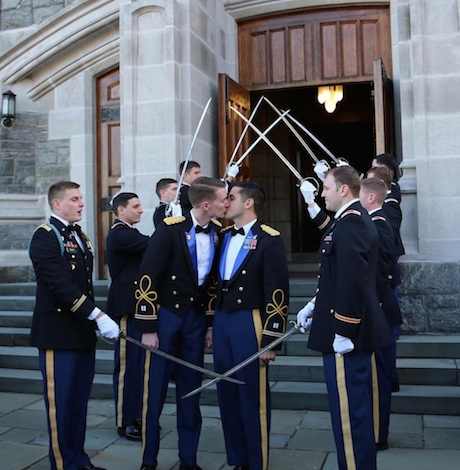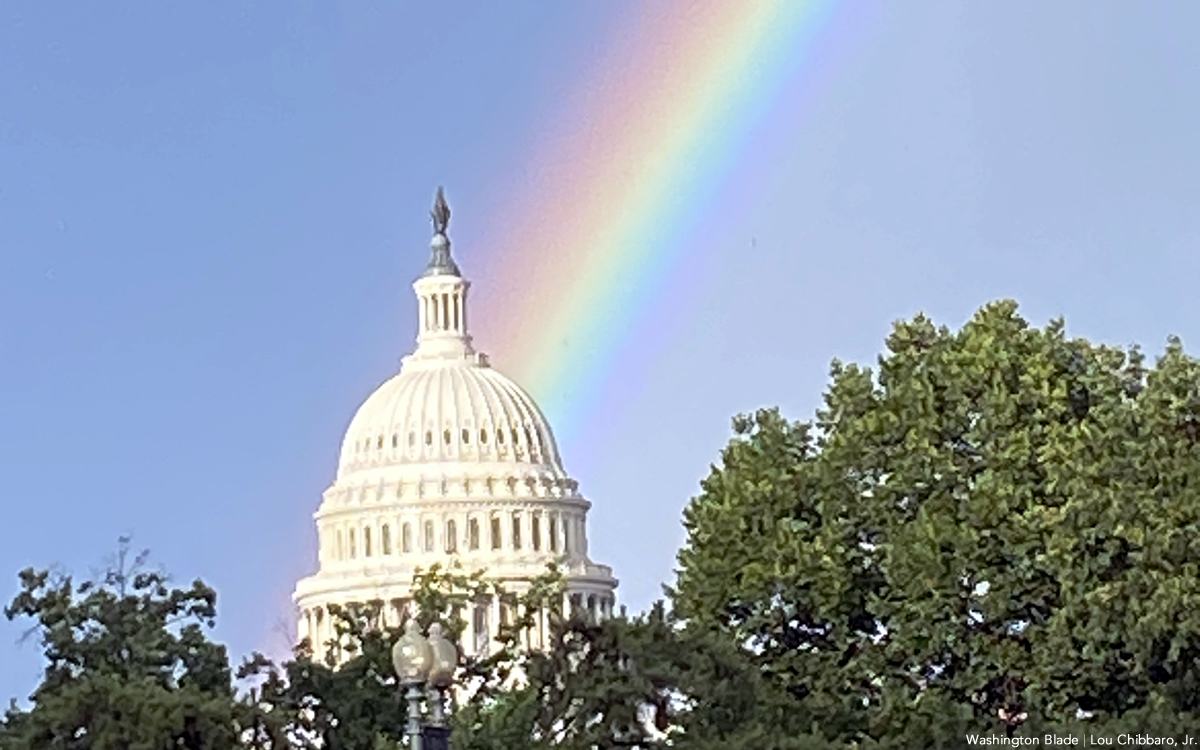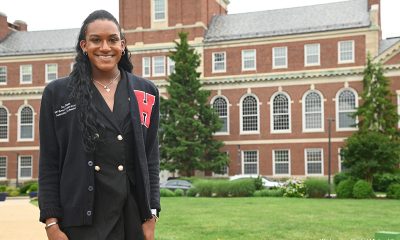National
First active duty gay couple wed at West Point
the couple exchanged vows in their blue mess uniforms

A gay couple wed in a historic ceremony on Jan. 13 that marked the first same-sex wedding at West Point, according to the New York Times.
Capt. Daniel Hall, 30, and Capt. Vinny Franchino, 26, exchanged vows in their blue mess uniforms at the Cadet Chapel in front of a crowd of 150 family, friends and other military officers. The couple, who both serve as Apache helicopter pilots in El Paso, Texas, exited the chapel under an archway of sabers.
Hall and Franchino met in 2009 when Hall was a senior and Franchino was a freshman. Although they were initially attracted to each other, they were forced to stay silent due to “Don’t Ask, Don’t Tell.”
“Through mutual friends at West Point, we had each learned the other was gay, and though we were attracted to one another, we couldn’t say or do anything about it,” Hall told the New York Times.
When “Don’t Ask, Don’t Tell” was repealed, they decided to openly pursue a relationship. Hall and Franchino went on their first date in 2012. However, homophobia was still rampant.
“That’s where some guy called us both faggots,” Franchino says.
The couple met another obstacle when Hall was deployed to South Korea. They agreed to date other people but eventually decided to get back together.
Although things haven’t been easy for the couple, Franchino says the freedom to be who they are is worth it.
“We’ve experienced everything from people feeling awkward around us to being called faggots while holding hands and walking down the street, stuff like that,” Franchino says. “But despite what we’ve been through, nothing was worse than having served during the ‘don’t ask, don’t tell’ years.”
U.S. Supreme Court
Supreme Court declines to hear lawsuit against Montgomery County schools gender guidelines
4th Circuit last August dismissed parents’ case

The U.S. Supreme Court on Monday declined to hear a lawsuit against Montgomery County Public Schools guidelines that allow schools to create plans in support of transgender or gender nonconfirming students without their parents’ knowledge or consent.
Three parents of students in the school district — none of whom have trans or gender nonconfirming children — filed the lawsuit.
A judge on the 4th U.S. Circuit Court of Appeals last August dismissed the case. The plaintiffs appealed the decision to the Supreme Court.

Representatives Suzanne Bonamici (D-Ore.), Mark Pocan (D-Wis.), and Sharice Davids (D-Kan.) reintroduced legislation to increase access to needed services and resources for LGBTQ seniors who live in rural areas this week.
The Elder Pride Act would bolster the capacity and ability of Area Agencies on Aging located in rural communities to better serve and support LGBTQ seniors who often require affirming care, services, and supports that are often underfunded and scarce in many parts of the country.
Recent surveys show that between 2.9 million and 3.8 million LGBTQ people live in rural American communities.
“LGBTQ+ elders and older people living with HIV live in every part of this nation, including rural areas. We all deserve to be able to age in our communities with the services and supports we need to remain independent,” SAGE CEO Michael Adams said in the press release announcing the reintroduction of the legislation. “We commend Representatives Suzanne Bonamici (D-OR), Mark Pocan (D-WI), and Sharice Davids (D-KS) on reintroducing the Elder Pride Act. And we honor the contributions of our many LGBTQ+ trailblazers whose tireless advocacy allowed us to reintroduce this critical bill. We look forward to working alongside Reps. Bonamici, Pocan, and Davids, and our LGBTQ+ pioneers nationwide to pass this legislation.”
“LGBTQI+ seniors should be able to access services and care that meets their unique needs, regardless of where they live,” said Bonamici, chair of the Equality Caucus’s LGBTQ+ Aging Issues Task Force.”Those who live in rural areas frequently face increased barriers, which Congress can break down. The Elder Pride Act will increase resources for programs and services that will improve the lives of LGBTQI+ elders.”
“The Elder Pride Act will improve the overall health and social and economic well-being of LGBTQI+ older adults and seniors living with HIV in rural areas by better equipping senior service providers with resources to address the unique needs of these communities. I’m pleased to introduce this important legislation with my colleagues and co-leaders on the Equality Caucus, Reps. Pocan and Davids,” Bonamici added.
“Rural LGBTQI+ seniors have been lacking access to necessary services and care for too long,” said Pocan, co-chair of the Congressional LGBTQ+ Equality Caucus. “The Elder Pride Act creates opportunities for LGBTQ+ seniors in rural communities, benefiting everyone in the region. I look forward to advancing this important legislation.”
“Many of our LGBTQ+ elders fought tirelessly for equality in a world that refused to accept their identity,” said Davids. “While they overcame tremendous odds to give future generations the rights they deserve, our elders, particularly those in rural communities, continue to face discrimination when accessing long-term care and healthcare. I am proud to support the Elder Pride Act because who you are and who you love should never increase your risk for isolation, poverty, and poor health outcomes as you age.”
The Elder Pride Act complements the Older American Act, which was updated under Bonamici’s leadership, by establishing a rural grant program designed to fund care and services for LGBTQ seniors. The grant would also support programs that:
• Provide services such as cultural competency training for service providers;
• Develop modes of connection between LGBTQI+ older adults and local service providers and community organizations;
• Expand the use of nondiscrimination policies and community spaces for older adults who are members of the LGBTQI+ community or another protected class; and,
• Disseminate resources on sexual health and aging for senior service providers.
A fact sheet on the legislation can be found here, and the full text can be found here.
State Department
State Department travel advisory warns of potential anti-LGBTQ violence
FBI issued similar warning this week

The State Department on Friday issued a worldwide travel advisory that warns of potential violence against LGBTQ people and LGBTQ-specific events.
“Due to the potential for terrorist attacks, demonstrations, or violent actions against U.S. citizens and interests, the Department of State advises U.S. citizens overseas to exercise increased caution,” reads the advisory. “The Department of State is aware of the increased potential for foreign terrorist organization-inspired violence against LGBTQI+ persons and events and advises U.S. citizens overseas to exercise increased caution.”
The advisory further urges U.S. citizens to:
- Stay alert in locations frequented by tourists, including Pride celebrations and venues frequented by LGBTQI+ persons.
- Enroll in the Smart Traveler Enrollment Program (STEP) to receive information and alerts and make it easier to locate you in an emergency overseas.
- Follow the Department of State on Facebook and Twitter.
The Federal Bureau of Investigation and the Homeland Security Investigations earlier this week issued a similar advisory.
The advisory notes June 12 will mark eight years since the massacre at the Pulse nightclub in Orlando, Fla.
-

 South America4 days ago
South America4 days agoPeruvian government classifies transgender people as mentally ill
-

 Autos2 days ago
Autos2 days agoSeductive sport-utes: Buick Evista, Subaru Outback
-

 District of Columbia4 days ago
District of Columbia4 days agoMeet Jay Jones: Howard’s first trans student body president
-

 a&e features4 days ago
a&e features4 days agoWhat’s new at Rehoboth Beach for summer 2024












